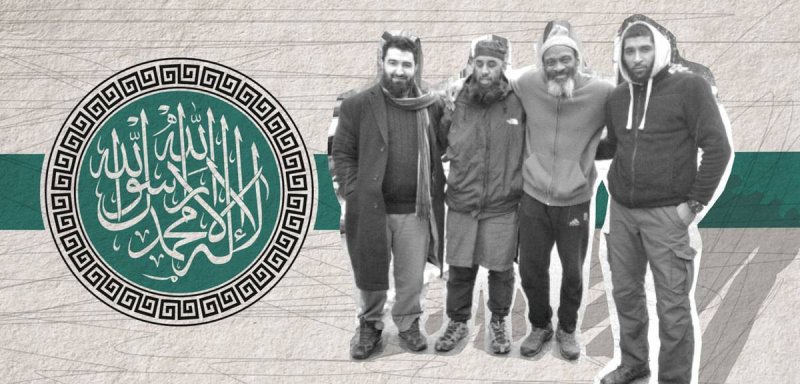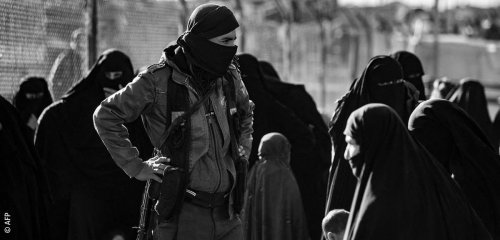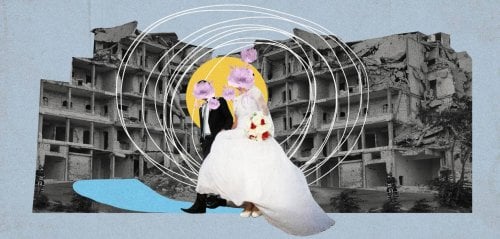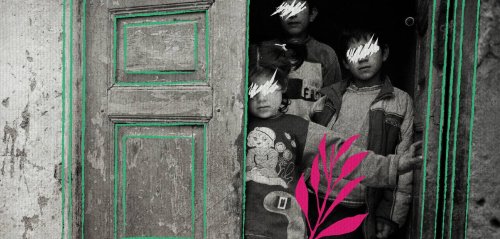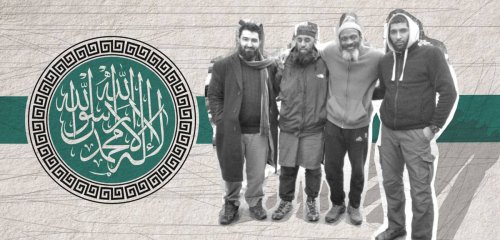It is no surprise that in another life Bilal Abdul Kareem, an American journalist who has lived in Syria since 2012, was once a comedian. His tendency to rely on comparisons, quick jokes, and a jovial attitude have likely proved useful in navigating the often chaotic landscape of rebel-controlled northern Syria.
Though a somewhat controversial figure, even Bilal’s detractors have a certain level of respect for him, considering that after ten years of war he is still alive and still reporting.
Indeed, as Tauqir “Tox” Sharif — a British-born aid worker of Pakistani origin and a close friend and peer of Bilal — lamented to me, Bilal’s personality and his street smarts have allowed him to survive the constant challenges one may face in northern Syria.
Bilal and Tox are two of the thousands of foreigners who flocked to Syria following the onset of the Syrian revolution in 2011. Unlike the vast majority of the ‘muhajireen’, or immigrants in English, they did not directly participate in the conflict. Instead, Bilal worked as a journalist and Tox as an aid worker.
To some, they are brave men who have put themselves in harm's way to help the innocent victims of a brutal war. To others, they are terrorists or, at the very least, terrorist adjacent.
The reason that Bilal and Tox stand out so much compared to other muhajireen, besides their “relatively” active social media presence, is their position on Hay’at Tahrir al-Sham (HTS), or the “Organization for the Liberation of the Levant”, the current iteration of Jabhat al-Nusra and the most powerful armed group in Syria.
While other muhajireen, such as Abdussamed Dagül, Shajul Islam, and Ibrahim bin Mas’ud, who are active in northern Syria in relief and journalism, have stood by HTS, Bilal and Tox have spoken out against it.
To some, they are brave men who have put themselves in harm's way to help the innocent victims of a brutal war. To others, they are terrorists or, at the very least, terrorist adjacent
Though there is an ideological component to why some muhajireen chose to stay with HTS, and others, like Bilal and Tox, spoke against it, the issue ultimately comes down to survival.
The long war
The countrysides of Idlib and Aleppo were two of the first regions in Syria to see armed groups capture large chunks of territory in the summer of 2012. In those days, the rebel factions were disorganized, underequipped, and probably were only able to make inroads in those regions due to their proximity to Turkey and the population’s general disdain for the Syrian regime under Bashar al-Assad.
Of the hundreds, if not thousands, of armed rebel groups that materialized in that time, two of the most prominent were Jabhat al-Nusra (al-Nusra Front) and Ahrar al-Sham, movements that sought to replace the Syrian government with an Islamic authority following the tenets of Sharia.
Jabhat al-Nusra was an outgrowth of the al-Qaeda-aligned Islamic State of Iraq (which would eventually become the Islamic State of Iraq and Syria, or ISIS). Led by a young veteran of the Iraq war, Abu Mohammad al-Jolani, al-Nusra quickly became a prominent group among the armed opposition, as its fighters were better armed, better trained, and had stronger financing.
In contrast, Ahrar al-Sham was a more local fighting force, being led by jihadists released from regime prisons shortly after the Syrian revolution broke out. Indeed, it was Ahrar al-Sham that initially hosted Bilal when he first arrived in Syria in 2012, and he met with one of the group’s founding members, Hassan Aboud, who later became its emir before he was assassinated in 2014.
Between 2012, when Bilal first arrived in Syria, and 2015, thousands of foreign fighters entered the country in droves to fight on all sides, with many joining ISIS following its takeover of eastern Syria and northern Iraq in 2014.
It was also around this time that Tox, Shajul Islam, and Abdussamed Dagül all traveled to Syria. Originally, these muhajireen seemed quite friendly with one another, regularly appearing on each other’s youtube channels and social media. All of them were critics of ISIS and its horrendous acts, while also being strong proponents of the armed opposition and the Syrian revolution as a whole. They all supported the growing Islamic character of the revolution as well.
After a few years of covering the war, Bilal established his own media operation, On the Ground News (OGN), which is still active. In the Summer of 2016, Bilal and Abdussamed, then working for OGN, made their way into Aleppo following a rebel offensive that broke the regime’s siege of the rebel-controlled eastern half of the city.
Stories of torture in the prisons of Hay’at Tahrir al-Sham became more and more frequent, "so I started talking to them about this issue, and this was back in 2016, or even before that”.. So did they listen to Bilal, who was close to them at the time?
However, the regime managed to reimpose the siege with Bilal and Abdussamed trapped inside. After four months of constant attacks by land and air, the two men managed to evacuate east Aleppo with fleeing rebel fighters who had cut a deal with Russia.
Torture and broken friendships
After another two or so years of covering the war in Idlib, Bilal’s disagreements with HTS began to come to the surface in 2019 following HTS’s imprisonment and torture of Marwan al-Umqi in April of the same year. Bilal released an interview with Umqi’s mother, who alleged that HTS had tortured her son to death.
Bilal maintained that he had made private criticisms of some of the practices of HTS before 2019, but that he did not have the necessary evidence to make a public statement. He tells Raseef22, “Going back as far as 2014, I began to hear things like there's torture in the prisons of Hay’at Tahrir al-Sham, or Jabhat al-Nusra as they were known back in those days: ‘They did this, they did that.’ So, you hear a lot of things about a lot of people, but I have nothing concrete, nothing firm because they were competing for Islamic legitimacy, and so things were a lot more hidden in those days.”
“As we moved forward in time, those stories that would come to me became a lot more frequent, so I started talking to them about it, and this was back in 2016, or even before that to be real: ‘Guys, you’ve got to take it easy with the prisoners, can’t operate like this’, and so on and so forth,” he continued.
Bilal went on to say that nobody would go on camera to make said accusations and, as a journalist, he could not move forward with the claims unless he had solid proof. It was also around this time that Abdussamed stopped working for OGN, with his last appearance being on March 15, 2019, just a month before Bilal released his interview with Umqi’s mother.
“Abdussamed Dagül and I were in the Aleppo siege, and even after the Aleppo siege finished, we were still good friends, and he said basically that he wasn’t going to continue with OGN anymore, and he ended up working for Anadolu Agency… and I wasn’t upset, you got to do what you got to do, and we were still cool,” Bilal told us.
He explained, “When all these things were becoming crystal clear about torture, indefinite detention, HTS giving away territories without fighting for them, I sat in Abdussamed Dagül’s house and discussed (the matter) with him, I said: ‘Brother man, you can’t continue to support these people’.”
Then, later, in 2020, Tox was captured by Hay’at Tahrir al-Sham, imprisoned, and, by his own account, tortured at the hands of HTS members.
“Now, when Tauqir Sharif got arrested and I did an interview, the last time I spoke to Abdussamed, he contacted me after the interview, and then he told me that I lied, and that I had told some lies in the interview. I said ‘Ok, that's fine, that’s fair enough’. I just said ‘Just tell me where, in your opinion, I lied, and I can either apologize for it, explain it, or what have you’, and he didn’t respond,” said Bilal.
While Tox was in prison, Shajul Islam claimed that Tox was being treated well, which led to Bilal releasing a report accusing the doctor of lying. Shortly after, Bilal himself was also imprisoned by Hay’at Tahrir al-Sham, with the two men eventually being released and being forced to leave Idlib for northern Aleppo, which by that time had come under the control of Turkey and its proxy force, the Syrian National Army (SNA).
Jerome Drevon, a senior analyst on jihad in modern conflict at International Crisis Group, said that, in many ways, Bilal had put himself on a collision course with HTS given his personal style of journalism and his outspoken nature.
Speaking to Raseef22, Drevon explained, “[Bilal] puts himself in a corner, because of the nature of his work, he started to cover all sorts of issues, internal and external. HTS has a certain way of behaving and they have authoritarian practices, and at some point, he understood that he had to cover that.”
After another two or so years of covering the war in Idlib, Bilal’s disagreements with HTS began to come to the surface in 2019
Drevon made it clear that ultimately one can negotiate with HTS, and they will make concessions, but that they prefer to do things behind closed doors as opposed to publicly. “The reality is you can negotiate with HTS on many things, even when people are detained and things like that. And HTS does make concessions but in private,” he said.
Interestingly, earlier this year, Abdussamed admitted in a live stream on February 12 that Tox had been “abused” while in HTS’s custody, but that it was not a systematic issue.
Abdussamed went on to claim that after Tox had complained of being tortured, HTS arrested his torturer, a man Abdussamed named as ‘Suraqah’. Tox was then permitted to watch Suraqah be lashed as punishment for abusing him.
However, Tox told Raseef22 that this was untrue and never happened.
Tough decisions
It is somewhat telling that Abdussamed Dagül and Shajul Islam did not respond when asked to be interviewed. Originally, I had believed that their decision to support Hay’at Tahrir al-Sham even after their friends were arrested, and — in Tox’s case — tortured by the group, was purely ideological.
However, after speaking to Bilal and Tox, it became apparent that ideology was only one, perhaps minor, component of that choice.
Following Jabhat al-Nusra’s transformation into Hay’at Tahrir al-Sham, the group increasingly focused on establishing its own provincial authority, which eventually became the Syrian Salvation Government (SIG). The group also began cracking down on dissent, from both other armed groups and individuals. It eventually became clear that to live in Idlib, especially for muhajireen, one must toe HTS’s line.
In this context, Drevon said, “HTS has now good control. They’ve subjugated all the other foreigners. The only foreigners that remain are foreigners that agree with HTS, otherwise they had to leave, or just had to shut up or they’d be arrested. There is no dissents to HTS. It's not allowed anymore.”
“It’s a hard choice… You either stay silent on what HTS is doing and just focus on the conflict, or you just go out against them, but then they will come down on you… And there it’s about survival,” he continued.
“In their view, they think Hay’at Tahrir al-Sham is right, and they’ve decided to side with that, which is ironic… Maybe because they’re afraid” — Tox Sharif speaking on colleagues who refused to acknowledge his torture
Though it is clearly impossible to really know what Abdussamed and Shajul Islam’s motives were, it likely comes down to two components: seeing HTS as the lesser of two evils, and the desire to survive and maintain their lives in Idlib, as opposed to living in exile like Bilal and Tox.
Here, Tox explained to Raseef22 regarding what they had said about him while he was imprisoned and being tortured, “When I got arrested I was unaware of the stance they had taken… and the way they tried to brush things under the carpet… But this is what happens, people take sides. In their view, they think HTS is right, and they’ve decided to side with that, which is ironic… Maybe because they’re afraid.”
Tox also went on to say that perhaps they saw HTS as the lesser of two evils, and that ultimately, because Hay’at Tahrir al-Sham is better than the regime, it should not be criticized.
Regarding the ideological component of their dispute, Tox told us that it really came down to torture and crushing dissent. “I mean, we believe torture is haram in Islam. We believe that it’s inhumane. They, for some reason, think that you can torture people, which is where the main disagreement is,” he said.
We saw that it was necessary to press Tox and Bilal about why they spoke out about HTS when they did, as opposed to when the group committed other serious crimes and offenses earlier in the conflict.
For Bilal, he said that he had spoken to them privately, and only moved against them when he had sufficient evidence.
For Tox, it was when they arrested him, as he then knew for certain that torture was being used in HTS’s prisons.
“My thing, as an aid worker… I need to be a bit more diplomatic in things that I’m doing,” Tox told us. “I wasn’t so vocal against the groups internally.”
Like Bilal and Tox, Abdussamed and Shajul Islam had to make a choice: would they toe the line and preserve their lives in Idlib, or not?
Last month, Hay’at Tahrir al-Sham entered Afrin, a region just north of Idlib, and then proceeded to advance on the city of Azaz
The future of Idlib and northern Aleppo
Last month, Hay’at Tahrir al-Sham entered Afrin, a region just north of Idlib, and then proceeded to advance on the major town of Azaz, of which Bilal is a resident. The pretext for the advance was infighting among factions of the Syrian National Army (SNA), which began when the Third Corps attacked the Hamza Division in the city of al-Bab, following Hamza’s assassination of Muhammad Abu Ghannoum, a prominent activist, and his pregnant wife.
The Third Corps, which is dominated by the Levantine (Levant) Front and Jaysh al-Islam, faced off against the Hamza Division and its major allies, the Sultan Suleiman Shah Brigade and Ahrar al-Sham.
Hay’at Tahrir al-Sham decided to intervene on the side of the Hamza Division, swiftly moving into Afrin city before facing stiff resistance at Kafr Jana from the Third Corps.
Interestingly, muhajireen politics actually foreshadowed this series of clashes almost a year before they happened.
In October 2021, HTS moved to expel Muslim Shishani and his allies from the Turkmen mountains and western Jisr al-Shughur. Muslim Shishani, who was close to Bilal, released a statement via OGN, before he eventually left his hideout for northern Aleppo.
Drevon explained that this was just another instance of Hay’at Tahrir al-Sham reinforcing its control over areas that fall under its jurisdiction. He said, “The bigger picture is, ultimately, HTS.. is creating a new military order.. The issue is people like Shishani and others, they haven’t understood that the war has changed”.
Then, in a February 5 live stream with Abdussamed Ibrahim Bin Mas’ud, Ibrahim mentioned that HTS would eventually attempt to unify the opposition in northern Aleppo. Later, Abdussamed again hinted that Hay’at Tahrir al-Sham may be seeking to take over northern Aleppo, but that it was not a priority.
“There are future goals, to unite all the areas, basically, but [it is] politically difficult, because Turkey is quite involved in those areas, and in those areas, Turkey has the say. So, if Turkey would allow HTS, that would be the only way for HTS to get involved in those areas, or HTS would have to fight, and take it, basically off the SNA, which would cause another bloodshed among the Muslimeen… So, I don’t think that’s HTS’s goal at the moment,” Abdussamed explained in mid-February.
At the time, there were serious concerns that the Syrian regime and Russia were about to start an offensive to take the Jabal al-Zawiya region of Idlib, which sits in the southern portion of HTS’s territory. However, only a few weeks later, Russia invaded Ukraine, and such an operation into Idlib never took place.
“Fighting for the principles of the revolution have gotten lost somewhere, and the people who are fighting for those actual principles are now looked at as dinosaurs, people who are not realistic”.. So recounts the American who does not want to leave Syria
Regarding last month’s clashes, Bilal and Tox continued to stand against HTS’s advance, covering the protests that occurred in Azaz against the move. Indeed, Tox was even threatened via social media.
“The [threats] on Twitter, just trolls, but the people that were messaging me on telegram, I’m assuming they're people that know me, but obviously they were keeping anonymous as well… We’ve had constant engagement with them, especially the [English] speaking members of HTS as well,” Tox explained.
Fortunately for Bilal and Tox, the Turkish military intervened and prevented Hay’at Tahrir al-Sham from capturing Azaz. There was much debate regarding whether the Turkish government had greenlighted HTS’s operation, but Bilal, Tox, and Jerome Drevon indicated that this was likely not the case.
Drevon explained, “I don’t think that Turkey wants HTS to go there, because there is the issue of Terrorist designation, and it's not possible for Turkey just to agree with this.”
Now, with a month of hindsight, it seems that Turkey did not explicitly greenlight HTS’s advance, but it also did not intervene as quickly as it could have. Indeed, Turkey may have seen HTS’s advance as a way to pressure SNA factions into forming a more unified command.
Finally, we asked Bilal how he felt about Ahrar al-Sham, the group that had originally hosted him when he first arrived in Syria, and later sided with Hay’at Tahrir al-Sham against the Third Corps. He responded, “Amongst too many of the people, the survival mode has kicked in, and fighting for the principles of the revolution have gotten lost somewhere, and the people who are fighting for those actual principles are now looked at as dinosaurs, people who are not realistic.”
Indeed, many of those who fought for the ideals of the Syrian revolution are long dead, or are in exile. The Free Syrian Army, which was the first major group to form against the regime, no longer holds any sway. Many of the early activists who called for justice and freedom are dead, in prison, or in exile. Only the cynics, like Bashar al-Assad and Abu Mohammad al-Julani, survived. Either way, Bilal and Tox’s work continues as Syria’s devastating war grinds on.
Raseef22 is a not for profit entity. Our focus is on quality journalism. Every contribution to the NasRaseef membership goes directly towards journalism production. We stand independent, not accepting corporate sponsorships, sponsored content or political funding.
Support our mission to keep Raseef22 available to all readers by clicking here!
Interested in writing with us? Check our pitch process here!
